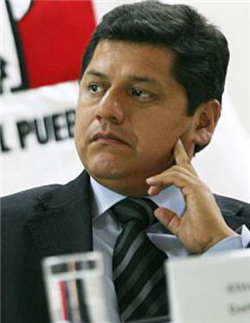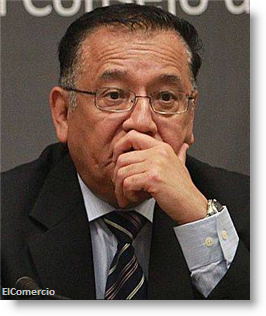Congress on May 18 failed to elect an Ombudsman when neither of the two candidates were given the minimum requisite of 87 votes, or two-thirds of the Congress.
For more than eight years, members of Congress in both the Garcia and Humala administrations have been unable to agree on who they want to head this conflict resolution office. It has not been for the lack of qualified candidates but because the incumbent administration and different political parties in the Congress each want to choose someone they hope will lean in their favor.

The interim Ombudsman, Eduardo Vega — who has been serving in that position since 2010— only received 59 votes in favor, with six votes against and 49 abstentions. The other candidate is a former head of the national magistrates’ council, Gastón Soto Vallenas, who received 62 votes in favor, six against and 47 abstentions.
Eduardo Vega became acting Ombudsman when Beatriz Merino resigned at the end of 2009. A former prime minister in the Toledo administration and the first woman to hold the Ombudsman job, Merino resigned when Congress failed to hold elections to either re-elect or replace her, and the Garcia administration at the same time did not ratify her position. She resigned the same year she had been elected with a wide majority as the Ombudsman for Ibero-America.
Merino strongly recommended that Vega should be elected to succeed her — he has worked in the institution since 1996 and has gained a reputation for remaining impartial in the different conflicts and social situations that come across his desk.

In contrast, and despite a larger number of votes, Gaston Soto comes under scrutiny from different legal institutions for his actions when he was head of the national magistrate’s council. His friendship with a number of people facing criminal charges, and particularly for his failure to order a disciplinary investigation into Justice Javier Villa Stein when the latter ruled that the murders by the Grupo Colina, the death squad organized by Vladimiro Montesinos during Alberto Fujimori’s administration, were not crimes against humanity. Villa Stein’s ruling was criticized by the Ombudsman’s Office as well as the Inter-American Human Rights Commission.
“It would be a terrible and grave error” to elect Soto, said Cruz Silva, a member of the legal team at the Legal Defense Institute, IDL. “Especially considering the importance the defense of fundamental rights will have over the next five years,” she added. Under the new administration, Keiko Fujimori’s Fuerza Popular party has an absolute majority in Congress, with 73 of the 130 seats, while social conflicts in mining and environmental issues have increased.
A special commission in Congress has another 10 days to call for a new vote, or they may postpone it until the next government, as they have done since at least 2009.





